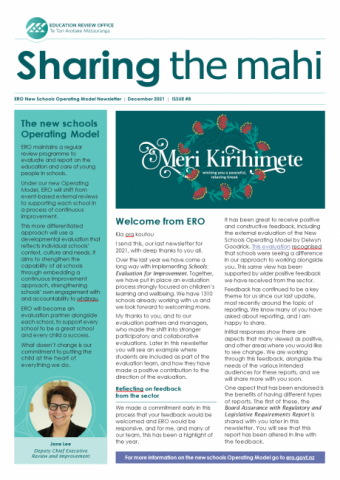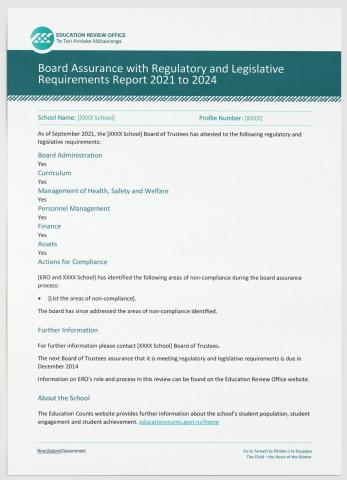

Welcome from ERO
Kia ora koutou
I send this, our last newsletter for 2021, with deep thanks to you all.
Over the last year we have come a long way with implementing Schools: Evaluation for Improvement. Together, we have put in place an evaluation process strongly focused on children’s learning and wellbeing. We have 1310 schools already working with us and we look forward to welcoming more.
My thanks to you, and to our evaluation partners and managers, who made the shift into stronger participatory and collaborative evaluations. Later in this newsletter you will see an example where students are included as part of the evaluation team, and how they have made a positive contribution to the direction of the evaluation.
Reflecting on feedback from the sector
We made a commitment early in this process that your feedback would be welcomed and ERO would be responsive, and for me, and many of our team, this has been a highlight of the year.
It has been great to receive positive and constructive feedback, including the external evaluation of the New Schools Operating Model by Delwyn Goodrick. This evaluation recognised that schools were seeing a difference in our approach to working alongside you. This same view has been supported by wider positive feedback we have received from the sector.
Feedback has continued to be a key theme for us since our last update, most recently around the topic of reporting. We know many of you have asked about reporting, and I am happy to share.
Initial responses show there are aspects that many viewed as positive, and other areas where you would like to see change. We are working through this feedback, alongside the needs of the various intended audiences for these reports, and we will share more with you soon.
One aspect that has been endorsed is the benefits of having different types of reports. The first of these, the Board Assurance with Regulatory and Legislative Requirements Report is shared with you later in this newsletter. You will see that this report has been altered in line with the feedback.
Looking ahead
We are all conscious of the complex environment 2021 has brought. Covid has affected our work programme and the onboarding of schools, particularly in Northland, Auckland and Waikato. As I write this, we as a country have just moved into the traffic light system. At all levels of the traffic light system, we will continue to work with you, although at some levels we will lean more strongly into a virtual presence via digital connection. As we move into 2022, we will listen with care and adjust to changing circumstances and your school’s context. We can confidently assure you that all ERO staff working with you are fully vaccinated.
Lastly, I wish you, your students, staff, trustees and school whānau a safe and restful holiday. We, like you, will be reflecting on the past year and setting goals for the year ahead.
Jane Lee
Deputy Chief Executive Review and Improvement
Partnership Profile: Mercury Bay Area School
Mercury Bay Area School’s guiding statement is ‘student-centered learning and achievement, students first’. As the school and ERO began to work together it seemed a natural fit during the initial exploring process to have students join the evaluation team to help identify ‘what is’ in terms of the school’s guiding statement. This information was used to help the senior leadership team prioritise ‘what next?’ in their strategic planning for 2022.
Evaluation ‘by students for students’ offers the opportunity to gather voice with real honesty to know how well the school is centering the curriculum on ‘students first’. Watch this clip to hear about their experiences as evaluators.
Board Assurance with Regulatory and Legislative Requirements Report
ERO is adjusting the way the Board Assurance Statement (BAS) is used in the new evaluation approach. The self-audit process for schools provides assurance that school Boards are taking all reasonable steps to meet regulatory and legislative requirements. A school Board attests that it is meeting requirements through the Board Assurance Statement and this will be publicly reported.
In the previous edition we introduced an update on the Board Assurance Approach. In this we said, “A public report will be posted on ERO’s website in due course. It is expected that the first of these reports will be towards the end Term 1 / beginning of Term 2, 2022”.
I’m thrilled to say that we are running ahead of schedule and some schools are ready to approve/respond to their Board Assurance with Regulatory and Legislative Requirements Reports now. As it is so close to the end of the year, these schools will be contacted individually and will have flexibility in the timing of any response. Congratulations and thank you.
Example Board Assurance with Regulatory and Legislative Requirements Report

New Evaluation Approach FAQs - December 2021
How does ERO work under the different COVID-19 traffic light levels?
At all levels all of ERO staff working in schools or early learning centres are required to be fully vaccinated, will be able to show their vaccine pass and will be following the Ministry of Health rules for good practice.
Red – We will undertake risk assessments in collaboration with the host school or centre to determine whether or not to continue with field work. If remote options are feasible these will be preferable to face to face, contact and field work.
Orange – We will continue to carry out evaluation activities in person, with on-site reviewing occurring in schools and early learning centres. Face masks will be worn in line with public health advice and as per school/ ELS policies.
Green – Business as usual, following Ministry of Health advice and good practice.
What is the new evaluation approach?
ERO maintains a regular review programme to evaluate and report on the education and care of young people in schools. Under our new approach, ERO will shift from event-based external reviews to supporting each school in a process of continuous improvement.
The new approach aims to complement your school’s own internal evaluation, strategic and annual planning and reporting approach, and to strengthen schools’ own engagement with and accountability to whānau.
ERO will become an evaluation partner alongside each school, to support every school to be a great school and every child a success.
What doesn’t change is our commitment to putting the child at the heart of everything we do.
What role does ERO play in this new approach?
ERO is shifting to a more developmental approach to evaluation, supporting each school’s improvement over time.
An ERO evaluation partner will work alongside each school. The evaluation partner will build a professional relationship with each school over time.
ERO’s evaluation role will connect with each school’s strategic planning and reporting cycle as part of an ongoing improvement journey. ERO is supporting schools to build and sustain high-quality evaluation as part of your planning for improvement focus.
Consideration of a school within its wider network and community is woven throughout the new Operating Model, which will also identify an opportunity to undertake evaluations at a community level.
What is an Evaluation Partner?
An ERO Evaluation Partner is a designated evaluator who will be assigned to work with your school. They bring evaluation expertise and will work through the evaluation process collaboratively with you, responding to your school’s unique context. They will have an ongoing relationship and work with your school over time.
At the completion of an evaluation for improvement phase, your school and ERO will work together to report and plan key actions and next steps in your school’s improvement journey.
What will reporting look like?
ERO‘s view is that all children and young people should have access to high-quality, effective education provision. Parents, caregivers, whānau and the community should have access to evaluation information about the quality and effectiveness of that education provision.
Schools are encouraged to update their communities as they progress through the new evaluation process and inform them about evaluation findings. ERO will be trialling a range of reports that provide formative and summative information about the collaborative approach to evaluations. What type of report, how they are used and when they are used will be different for different schools. Reporting evaluation findings will reflect the schools startegic planning and reporting cycles and be used to support improvement for tamariki and ākonga.
How often will I see my Evaluation Partner, and for how long?
Every evaluation is a bespoke process that responds to a school‘s individual context. A responsive approach allows ERO to direct more resource into working with schools who would benefit the most. This means the Evaluation Partners will spend varying amounts of time in different schools depending on identified needs.
What is the biggest difference that schools will notice going into Phase 1 (Initiating) of the new approach?
The school will have the opportunity to develop an ongoing evaluation relationship with ERO. During phase 1, initial organisational arrangements are established and doors opened to engaging with key stakeholders and other participants who may be involved in the evaluation. This phase will lead quite quickly into Phase 2 (Exploring and Focusing).
How and when are schools onboarded?
Schools are being brought into the new approach progressively, starting at the beginning of each Term throughout 2021 and 2022. Each school will receive a letter from ERO during the previous term advising when it is due to join the new approach.
Decisions on when each school is brought into the approach are systematically planned within each ERO region and include factors such as the timing of a school’s most recent review and ERO’s internal resourcing.
Your feedback matters.
ERO’s approach will continue to be iterative as all schools are introduced to the new approach.
The feedback from your school and ERO evaluation partner will contribute to the development of the model. Please share your feedback directly with your Evaluation Partner.